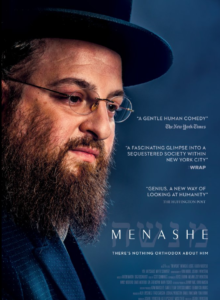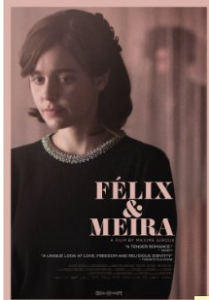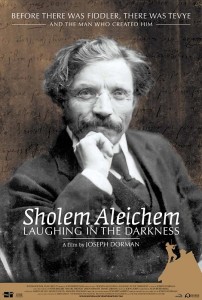July 26th, 2017 — 5:33am
 ***
***
Menashe-sp
It is not very often that we see a film all about the Hassidic community and completely in Yiddish (with subtitles of course).
Documentary filmmaker Joshua Z. Weinstein jumped into this project with all four hats (or should we say Yamakas) as director/writer/producer and cinematographer. He was able to connect with Hassidic Jews who spoke Yiddish and were interested in acting in this movie. This is a story of Menashe (Menashe Lustig) who is a recent widower and wants to continue taking care of his 10 or 11-year-old son, Rieven (Ruben Niborski) despite the Rabbi’s (Meyer Schwartz) view that the brother-in-law (Yoel Weisshaus) and his wife would be better caretakers. Menashe is also resisting the pressure that he should make an arrangement with the matchmaker and get a new wife.
On one hand, this could be a universal theme that might be set in other cultures but it is a unique accomplishment to pull it off in the ultraorthodox Hassidic community. The real Menashe (the actor) was quite genuine as the on screen Menashe. The child actor was superb equaling his father with facial expressions, which conveyed the complicated feelings that they were portraying.
While this movie was ultimately picked up by A-24 for distribution, it was made with a low budget. However, the story came across as quite authentic and was able to use the streets of Brooklyn and a sufficient number of appropriate extras to convey a genuine realistic atmosphere. This was a special accomplishment since the director/writer was not fluent in Yiddish and this project required numerous translators to assist in all aspects of it.
When a project such as this one is so successful in bringing a unique cultural environment to the screen, it makes us want to see an even more complicated in-depth story than what was delivered. Also missing were depictions of the positive values with mutual support of this group of people especially at times of holidays and the Sabbath. Nevertheless, we believe that many viewers will find this a worthwhile cinematic experience. (2017)
Comment » | 3 Stars, Drama
April 24th, 2015 — 7:29am
 **
**
Felix and Meira – sp
You may have a negative impression of the Hassidic community, as a cloisted male-dominated sect where the woman’s role is to take care of the children and serve the men while they sing their songs, do their dancing and prayers. If that is the case, this movie will not change your mind and will confirm your thinking. Meira (Hadas Yaron) is such a wife living in a Hassidic community located in Montreal who has one child so far but uncharacteristically does not want anymore and does not like the role that is expected of her. She has a chance meeting with Felix (Martin Dubreuil) who is a single man who is not part of her community. We see that she is drawn to him and sees her way out of the life that has been fated for her. This is much to the consternation of her husband, Shulem (Luzer Twersky) who realizes what is happening but can only demand that she should do what he feels she is supposed to do and that is follow the rules of her community. If we were expected to develop an understanding and insight into all these characters, our opinion is that the film was unsuccessful. We know essentially nothing about them as individuals, perhaps with the exception of Felix who we know had a father who never showed any love to him although it seems irrelevant to the plot. Certainly, we do not know the back story of the other main characters. We find them all two-dimensional. The acting and the setting seemed quite genuine. This is a French film directed by Maxime Giroux who also wrote the screenplay, It seamlessly moves back and forth from English and Yiddish with subtitles as needed. However, what we needed here was a story with more depth to it. (2015)
Comment » | 2 Stars, Drama, Foreign
August 21st, 2011 — 6:53am
***

Sholem Aleichem: Laughing in the Darkness-rm – If you only knew that Solomon Rabinowitz alias Sholem Aleichem had originated the story of Fiddler on the Roof, “that would have been enough.†However this documentary attempts to show how this creative Jewish writer born in Russia in 1860 singularly chose to use Yiddish, which was basically a spoken language of the shtetl and make it a literary form to educate and entertain thousands if not millions of people in Europe and the new world during most of his life time (and beyond). Yiddish was the special language of the Jews consisting of mixture of German, Russian, Hebrew and probably a lot more. It allowed more expression of feelings, especially humor and it was experienced as the language of the people. This fact plus the insight into the struggles and emotions of the people about whom Shloem Aleichem chose to write in a very prolific manner, made his writing very popular. This was the period of time when people living in their small enclaves began to migrate to the cities as well as across the ocean to America. When he died in 1916 there were more than 100,000 people at his funeral in New York which not only was viewed as a tribute to him but as a demonstration of the emerging Jewish culture in the new world. This documentary while emphasizing his place as a writer and as a Jewish icon also provides some insight into the ups and downs of his life style, which included being a stock market speculator who ultimately failed in his financial dealings. It shows somewhat of a picture of his family life as a dedicated parent although it doesn’t say much about his wife and his marriage. The visual story is made mostly with archived photos of the people of his time including what seemed to be a repetitive photo of him along with a few video clips- the most riveting being the one from Fiddler. This is an enlightening view of a person about whom so many of us have heard, but don’t really know. If it has not been done yet, a fictionalized version of this story with the details flushed out even more with some imagination, if necessary, will make a fantastic feature film. You can start speculating on who should play the lead. (2011) Â
Comment » | 3 Stars, Biography, Documentary
 ***
***




